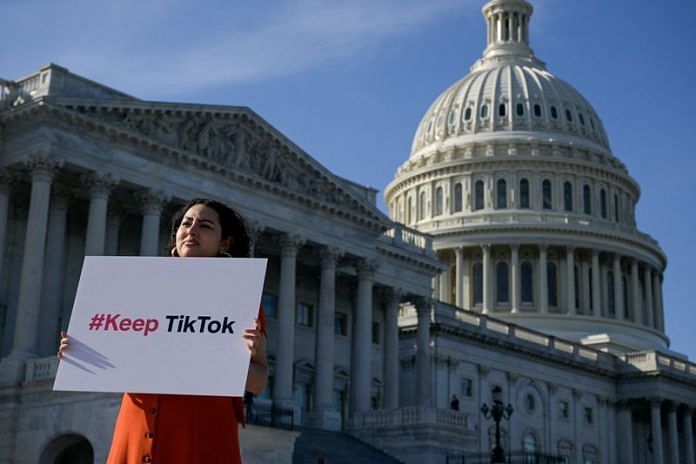By Mike Scarcella
(Reuters) -TikTok’s new lawsuit to block a U.S. law forcing the social media company’s Chinese parent to divest it or be banned could spark a landmark clash over free speech, government power and the balance between open commerce and national security, experts told Reuters.
ByteDance has until Jan. 19 to sell TikTok’s U.S. assets. The legislation, signed by President Joe Biden last month, was spurred by fears that China could use the popular video-sharing app to spy on its 170 million American users.
TikTok’s lawsuit called the measure an “extraordinary and unconstitutional assertion of power.” The company, which has denied sharing U.S. user data, said the law unfairly singles out TikTok but puts all media at risk by circumventing free speech protections.
Promoters of the law have said it has nothing to do with speech but merely regulates a commercial activity. Some civil liberties advocates like Jameel Jaffer, executive director of the Knight First Amendment Institute, counter that the U.S. effort against TikTok is “censorship – plain and simple.”
“The First Amendment means the government can’t restrict Americans’ access to ideas, information, or media from abroad without a very good reason for it – and no such reason exists here,” Jaffer said. He said the law resembles measures by repressive foreign regimes to stifle citizens’ access to media.
The U.S. Justice Department, which will defend the law in court, declined to comment on Tuesday.
TikTok’s petition asked the U.S. Court of Appeals for the D.C. Circuit to apply the highest form of review in U.S. constitutional cases, called “strict scrutiny.” That standard would put a greater burden on the government to show that the new law does not trample core speech protections, at least not unavoidably.
Legal experts said the government would likely argue that national security or some other compelling government interest is at stake and that the law was “narrowly tailored” to address it, with no lesser option available.
Critics spot a weakness in the government’s potential case on this point: Washington thus far has seemed unconcerned about abuse of users’ data by other social media platforms.
Companies such as Meta Platforms’ Facebook collect, store and share users’ data, but the government has never treated that activity as a national security threat or enacted data protections.
The Electronic Frontier Foundation’s David Greene has said that if the U.S. were really concerned about China and data privacy, it would push legislation that applies to all social media companies, not just TikTok.
The government might argue that TikTok could continue to operate and U.S. users continue to use it, just not under Chinese ownership, so the law’s effect on speech was “incidental” and permitted.
Showing a compelling national security risk could sway the court, legal experts said, but so far details driving those concerns have not been made public.
Cornell Law School Professor Gautam Hans, who teaches First Amendment law, said the “problem now is we are taking a lot on faith.” It was difficult to imagine the court upholding the divest-or-ban law without evidence of “what exactly the risks are,” Hans said.
TikTok said in the lawsuit that “speculative concerns fall far short of what is required when First Amendment rights are at stake.” The law’s national security premise was undermined by the “continued use of TikTok by President Biden and Members of Congress,” it said.
TikTok has already foiled, for now, a more localized U.S. effort to ban the app outright.
In November, a U.S. federal judge in Montana preliminarily blocked the state’s effort to ban TikTok within its borders, after TikTok and some users sued on First Amendment grounds.
Montana, backed by Virginia and 18 other states, is challenging the order on appeal.
(Reporting by Mike Scarcella; Editing by David Bario, Tom Hals, David Gregorio and Richard Chang)
Disclaimer: This report is auto generated from the Reuters news service. ThePrint holds no responsibilty for its content.



